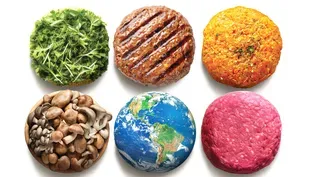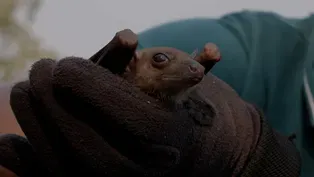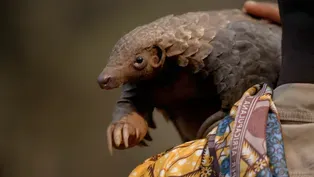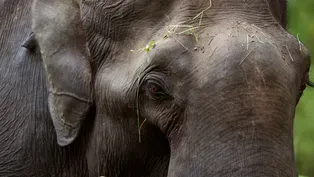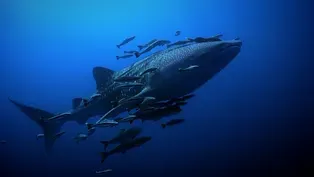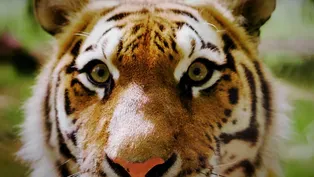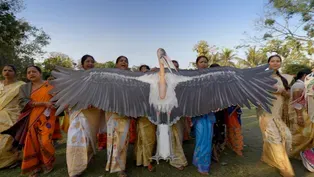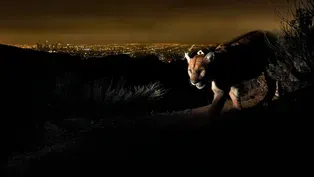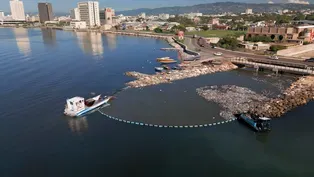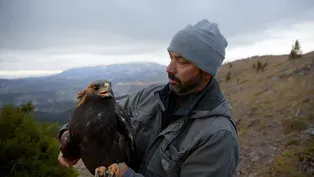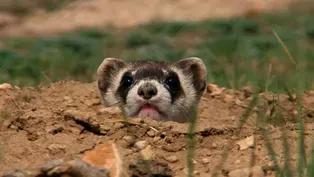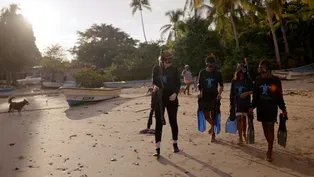
A Farm Goes Wild | WILD HOPE
Special | 8m 36sVideo has Closed Captions
Can ancient cattle and water voles restore rural Great Britain?
For years, Derek Gow worked his 400-acres in western England as a conventional sheep and cattle farm. But as both a farmer and conservationist, he knew that wasn’t right for nature. Now, he’s using his experience with British rewilding projects to return his land to what it once was: a healthy, biodiverse ecosystem.
Major support for NATURE is provided by The Arnhold Family in memory of Henry and Clarisse Arnhold, The Fairweather Foundation, Sue and Edgar Wachenheim III, Kate W. Cassidy Foundation, Kathy...

A Farm Goes Wild | WILD HOPE
Special | 8m 36sVideo has Closed Captions
For years, Derek Gow worked his 400-acres in western England as a conventional sheep and cattle farm. But as both a farmer and conservationist, he knew that wasn’t right for nature. Now, he’s using his experience with British rewilding projects to return his land to what it once was: a healthy, biodiverse ecosystem.
How to Watch Nature
Nature is available to stream on pbs.org and the free PBS App, available on iPhone, Apple TV, Android TV, Android smartphones, Amazon Fire TV, Amazon Fire Tablet, Roku, Samsung Smart TV, and Vizio.
Buy Now

Explore More Ways to Watch
Bring the beauty and wonders of wildlife and natural history into your home with classic NATURE episodes.Providing Support for PBS.org
Learn Moreabout PBS online sponsorshipMore from This Collection
Mission Impossible | WILD HOPE
Video has Closed Captions
Meet the genius behind the plant-based Impossible Burger. (39m 41s)
Pangolin Protectors | WILD HOPE
Video has Closed Captions
Due to the demand for their scales, pangolins are the most trafficked animal in the world. (12m 24s)
Way of the Elephants | WILD HOPE
Video has Closed Captions
Elephant migration corridors in India are a necessary thoroughfare for one of the largest animals. (15m 11s)
Whale Shark Homecoming | WILD HOPE
Video has Closed Captions
A renowned spiritual leader is inspiring fishermen to become guardians of the world’s biggest fish. (16m 49s)
Video has Closed Captions
The artificial intelligence keeping tigers at bay. (14m 31s)
Video has Closed Captions
In northeastern India, the greater adjutant stork has been considered an ill omen for generations. (16m 40s)
Video has Closed Captions
One cougar’s legacy in the heart of Hollywood. (13m 56s)
The Great Ocean Cleanup | WILD HOPE
Video has Closed Captions
Inventor Boyan Slat is on a mission to rid oceans of plastic. (15m 12s)
Video has Closed Captions
Golden eagles are declining due to an unlikely poison: lead ammunition left behind by game hunters. (13m 11s)
Video has Closed Captions
The decades-long fight to save America’s black-footed ferrets. (18m 11s)
Protecting Paradise | WILD HOPE
Video has Closed Captions
Marine biologist Callie Veelenturf uses her research on endangered sea turtles to help protect them. (14m 11s)
Providing Support for PBS.org
Learn Moreabout PBS online sponsorship(birds chirping) ♪ (cow mooing) ♪ DEREK: I'm holding in my hand a handful of #*#*#*#*.
Actually, there's absolutely no smell to that other than Earth.
And that's because this has no chemicals in it.
If you were doing this in an industrially farmed landscape, it would stink.
(cows mooing) We have maybe 400 acres of farmlan.. which we're now changing back solidly for nature year on year.
♪ I feel that what I do here has capacity to effect change in the sense that you can show people what can be done.
It's important to bring back the native species because they can restore function to landscapes in Britain.
♪ NARRATOR: For years, Derek Gow worked this land in Western England as a conventional sheep and cattle farm.
But as a farmer and conservationist, he knew that wasn't right for the natural world.
DEREK: We've engineered the landscape to suit ourselves because we want to use every last inch of it.
We've taken out the wetlands and the woodlands to create an environment that's increasingly toxic, and increasingly bereft of life.
There has to be change, both in the way we think and we respond our.. to the care of our natural environment.
NARRATOR: In 2018, with a vision based on decades of work in ecology and native species reintroduction, Derek decided to walk the walk.
He took down the fences, sold off the livestock, and began rewilding the land on his Coombeshead farm.
It was the first step in restoring the local ecosystem.
DEREK: So the point of all this, is that we're trying to take a landscape which is homogenous and bland, and put features back into it.
You seed it, you bring the water up.
You then start to put texture like log piles, rock piles, which make it possible for other life to exist.
♪ NARRATOR: Inspired by other successful rewilding projects, Derek forged his own approach, (birds chirping) including a program to breed threatened species for reintroduction across Britain.
He brought on ecologist Pete Cooper to help.
PETE: If you give nature that space, if you give native species a chance to breathe, then we have a fight we could possibly win.
To give something back to nature by wilding it, it can make a huge difference.
(cows mooing) ♪ NARRATOR: Derek replaced his livestock with ancestral breeds that helped shape Britain's living landscape long ago.
DEREK: We keep animals that are domestic as lawnmowers or burrowers or the creators of wallows.
They're not producing food or they're not producing meat or milk or anything else.
NARRATOR: Galloway cattle imitate the ancient Auroch, the wild ancestor of all domestic cattle.
(cows mooing) ♪ Along with Exmoor ponies, the oldest horse breed in the UK, their grazing behaviors create habitats that encourage plant growth and insect life.
Iron Age pigs are a modern hybrid meant to emulate the wild boar that roamed these fields 4,000 years ago.
DEREK: You want big animals like a few boar running through to create wallows that- that- that -then become ephemeral pools, so you get more amphibians on the landscape as well.
♪ NARRATOR: Five years on, the results are easily visible.
PETE: Right now, this pond's actually full of tadpoles, so some of the local frogs and toads have taken advantage of these ponds that become available over the winter and the tadpoles absolutely feasting in this area.
It's both a home in its own right, but it was also a food shop for some of the other species at the same time too.
DEREK: By returning water to the surface of the landscape, you create living space for all the other creatures like ducks, amphibians, water beetles, dragon flies.
Everything is intricately linked.
(birds trilling) ♪ NARRATOR: But there's one animal that takes landscape engineering to a whole new level, beavers.
PETE: The beavers creating habitat on a vast scale for so many smaller species.
These are our most industrious ecosystem changing animals, only beaten by us and elephants in terms of the environmental change they can bring about.
NARRATOR: Derek's brought back beavers, not only to his farm, but to other locations across the country.
DEREK: I mean, I've been involved with- with reintroduction project for be.. in Britain for a quarter of a century.
In the beginning, there were a few other people who were interested, but not very many.
NARRATOR: Over the years, beaver reintroductions and public support have increased.
♪ There's also another eco-engineer that Derek is working to reestablish across Britain, water voles.
These small rodents live along rivers and streams and have been in severe decline.
PETE: Water voles are actually the reason that Derek kind of worked his way to beavers in the first place NARRATOR: Like the beaver, but at a smaller scale, water voles can also reestablish critical but compromised wetland systems.
DEREK: When we come to a time where we've just so changed the landscape, so removed his aquatic element, all the things that are dependent on them go too.
So it's not a simple loss of a single species, it's the complex chain of interactions.
NARRATOR: So Derek has been breeding water voles for distribution across England since 2001, but now he's ramped up to an industrial sized plan to bring them back.
DEREK: We have a water vole farm here.
These are our water vole breeding pens.
So they function on a really simple principle of what the species needs is borrowing medium they make nests in which are snug and cozy for the babies.
Each cage can produce about 22 babies on average a year.
NARRATOR: That adds up to as many as 2000 voles released a year, a legion of many eco-architects, that will improve the aquatic environment.
DEREK: They make loads and loads of burrows, like muskrats, into the banks of- of rivers and streams, and small creatures like frogs and toads and lizards use their burrows.
NARRATOR: Derek believes rewilding a significant population can help restore those habitats all across the country.
DEREK: We're producing them for projects in the north of England to reintroduce water voles into the Lake District, which is a big English region, but where not a single water vole survives.
(birds chirping) ♪ NARRATOR: Derek has also begun breeding storks, wildcats, and other animals for future rewilding projects.
♪ DEREK: Year on year.
You see these relationships getting stronger and you see the demand for animals like this rising significantly.
And I think in that there is great hope.
All these things are tiny steps, but the tiny steps, in the end, that lead to the assemblage of a jigsaw, which even though it's got huge parts missing, starts to form a picture again.
♪ ♪ ♪ ♪
Major support for NATURE is provided by The Arnhold Family in memory of Henry and Clarisse Arnhold, The Fairweather Foundation, Sue and Edgar Wachenheim III, Kate W. Cassidy Foundation, Kathy...
